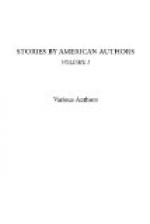The very first sentence on honesty put him in the light of a blackmailer—one that threatened mischief if his demands were not complied with. The next sentence went to show that he was an egotist, because he thought his labors required wear and tear of brain. The third called him a sound cog-wheel. The latter part of the same said that a villain could do no evil if he wished to, for they (the directors) had protected themselves against villains. Then it went on to say that the writers did not understand how anxiety and caution could be involved in the pursuit of his duties; and then it was thrown out that his marriage was his seeking—not theirs. Finally, they patted him on the head.
The devil!
Fields passed a sleepless night. He felt that he had been belittled to the extremest point, and that there was not a foothold left for his dignity. His soul was incised and chafed, and he lay awake thinking that degradation of himself and his office could have proceeded no further.
Toward morning he hit upon a plan to establish himself in what he believed to be the proper light. “It will require nerve,” reflected he, doubtingly, “and not only nerve in itself, but a certain exact quantity of it. Too much nerve would destroy me, and too little nerve would do the same thing. I think, however, that I can manage it. I feel able to do anything. Even a paying teller will turn if—” etc., etc.
* * * * *
III.
On the following Monday there was a special meeting of the directors for the purpose of examining the books and accounts of the bank. The bank-controller was expected to call for an exhibit within the coming week, and it was desirable that the directors should feel assured that their institution was in the proper order. The call of the controller was always impending. It might come any day, and it would require an exhibit of the condition of the bank on any previous day. He was permitted to make five of these calls during the year, and, inasmuch as he was at liberty to choose his own days, his check upon the banks was complete. If he found a bank that had not fulfilled the requirements of law, he was obliged to take away its charter, and to close it: hence the examination-meeting in the present case. The accounts of the tellers were passed upon, the cashier’s books were looked over, as were also those of the regular bookkeepers. There seemed to be no errors, and the contents of the safes were proved. There was perfect order in all the departments. The clerks were complimented. “Now,” said Fields to himself, “is my opportunity.”
On the next day at ten o’clock the directors again assembled—this time for their regular labors—to examine the proposals for discount.
The day happened to be cold and stormy. The twenty clerks were busily and silently at work behind their counters and gratings, and the fourteen directors were shut tight in their mahogany room. There was but little passing to and fro from the street, though now and then a half-frozen messenger came stamping in, and did his errand, with benumbed fingers, through the little windows. The tempest made business light.




